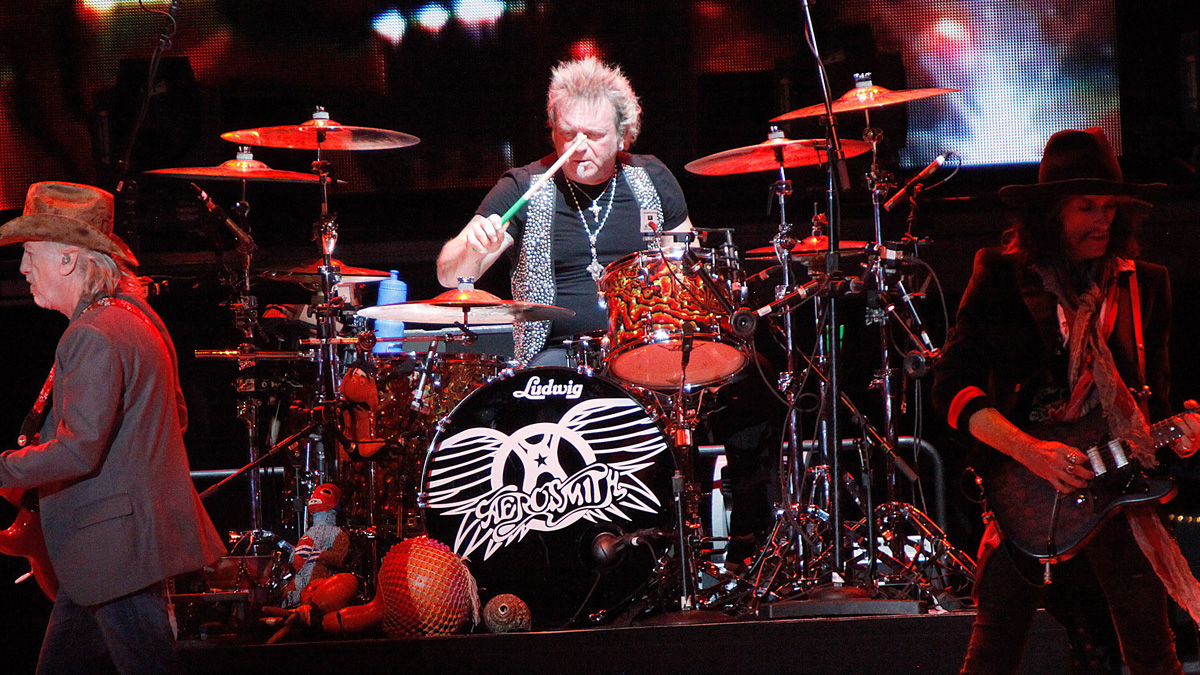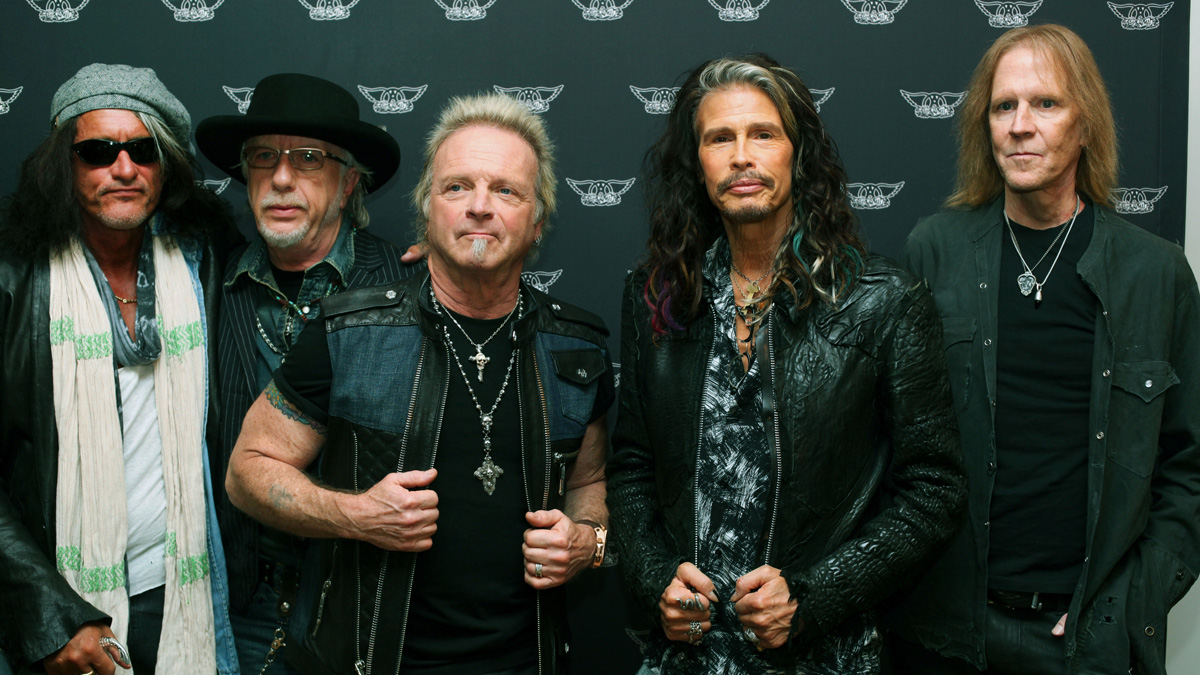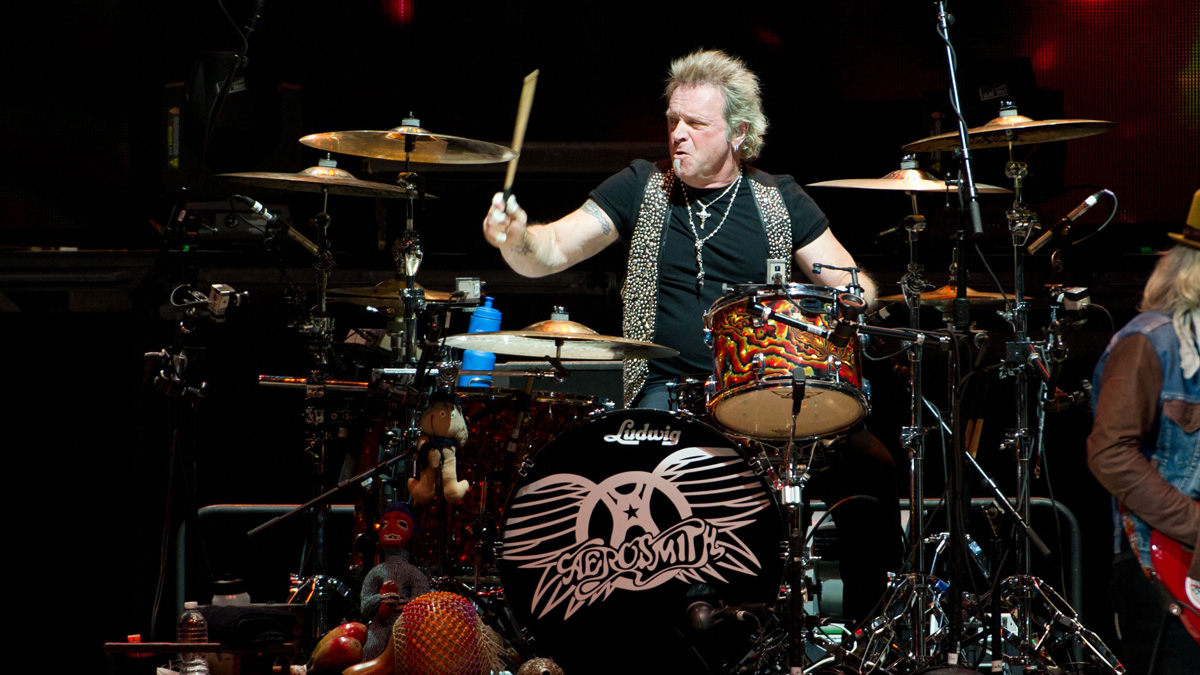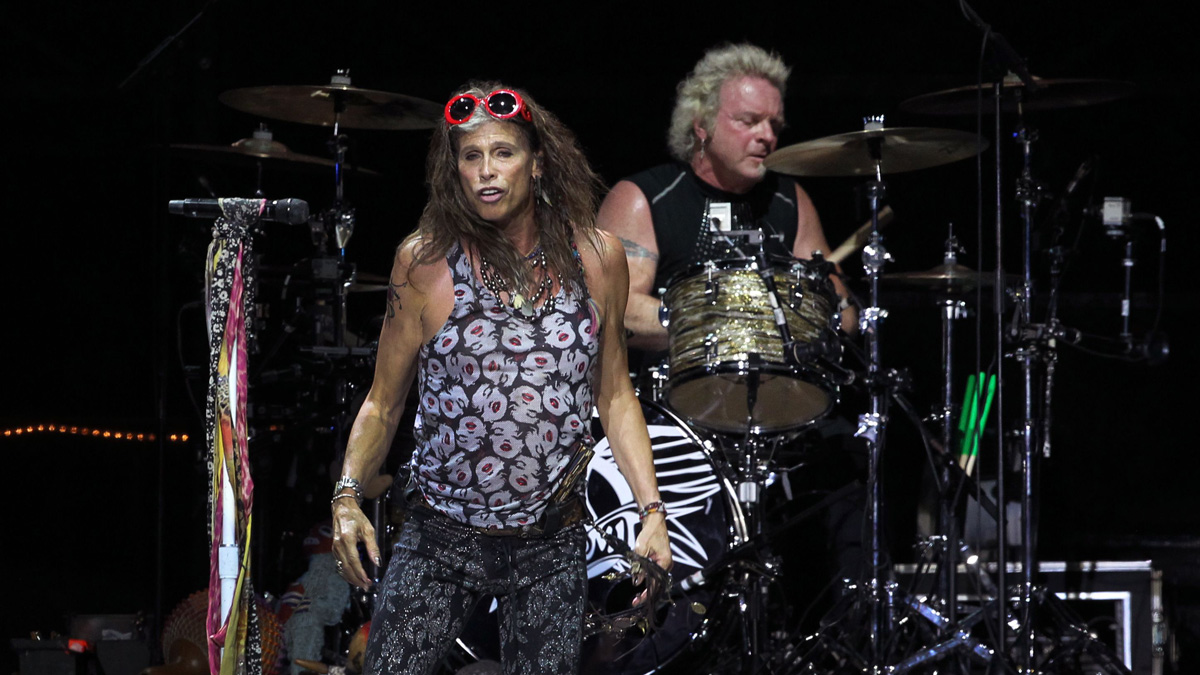Joey Kramer on surviving and thriving with Aerosmith
Drum titan on five decades of hard rocking and iconic band’s farewell tour

Bringing the r'n'b...
Clocking up almost 50 years with the same band is no mean feat. When said band is one as turbulent as Aerosmith, the achievement becomes all the more incredible.
But, that is the milestone that is coming into view for Joey Kramer. As the band limbers up for the first dates of their Aero-Vederci Baby world tour this summer, Kramer has been behind the kit for the Boston bad boys for 47 years and counting.
Since then, the band has been through the wringer. Drink and drugs almost tore them apart in the 1970s and 80s. Bassist Tom Hamilton has beaten cancer not once, but twice. And Kramer himself has faced his own demons, battling depression in 1995.
But somehow, each and every time the band has come back stronger than ever before. After their brief split with guitarists Joe Perry and Brad Whitford in the early ‘80s they came back with a run of hit albums that made them the hottest band on the planet. Kramer’s mid ‘90s recovery was welcomed by the band scoring their first, and only, Number One single with I Don’t Want To Miss A Thing. These boys always land on their feet.
I was a big Pretty Purdie fan. I have heavy rhythm and blues influences and that is what I bring to the table with Aerosmith
And it’s no fluke. Aerosmith’s wealth of killer tunes has helped them bounce back time and time again. Kramer has more than played his part in amassing this enviable catalogue. In the hands of a lesser drummer tracks like Rag Doll, Love In An Elevator and Walk This Way might be straight-ahead rockers. But Kramer’s love of r’n’b has helped to inject a bounce into the beats; he brings the funk to Joe Perry’s blues and Steven Tyler’s soul.
When we speak with Kramer, he is preparing for a run of European farewell shows with the band, including what is billed as their final-ever UK performance at the Download Festival in June. However, with the rest of the world still to come we think he has a good chance of making it into that 50th year with the band. We wanted to find out all about the Aerosmith’s numerous flirtations with obliteration, Kramer’s unmistakable style and what the future holds.
Steven Tyler was Aerosmith’s original drummer, so how did you land the gig?
“I was recommended to play with Tom and Joe through a mutual friend of ours. I knew Steven because he and I went through a couple of years of high school together but Tom and Joe didn’t know that. So when they told me that they didn’t think they’d want to use me because they had a friend coming up from New York who was going to play drums and sing, I asked them who it was because I was from New York as well. It turned out to be Steven and the rest is pretty much history.”
It sounds like there’s a lot of soul in your playing. Was r’n’b a big early influence on you?
“Yes, I was a big Pretty Purdie fan. I have heavy rhythm and blues influences and that is what I bring to the table with Aerosmith. My favourite rock and roll drummers were guys like Mitch Mitchell and, of course, Bonzo. The mixture of all of the rhythm and blues that I listened to together with those rock and roll drummers is what I bring to the table. With me it’s more of a groove and a pocket sort of thing.”
That r’n’b influence comes through on songs like Rag Doll and Walk On Water. They have a real groove and a feel.
“Yeah, my playing is all about feel. I’m completely self taught, I never took any lessons or anything. I’m a street player and all of my influences come from bands that I was listening to at the time when I was growing up. I was very impressed with guys like Mitch Mitchell. I liked rock and roll drummers and I loved rhythm and blues guy like Clyde Stubblefield with James Brown, man, that band blew me away all of the time. I took those two things and brought them together in my playing and that helped Aerosmith stand out a little bit.”

Breakthroughs and breakups
How experienced were you by the time you went in to record the first Aerosmith album?
“When we went in to make that record that was the first time I had ever been in a recording studio. I was completely inexperienced and had no idea what I was doing. We were recording all of the tracks live. One of the things that I would love to do is to go back and remix that album. There’s a lot of drumming on that album that was mixed down and you can’t really hear it. There’s some cool stuff on there. The songs on that record stand up for themselves, though.”
You had an incredible early run of records with the debut and then Toys In The Attic, Rocks and Draw The Line bringing you big, breakthrough success
“I like Rocks, that’s a good one. Toys… and Rocks pulled us ahead of the pack. Other than that we kind of then faded away for a bit until we came back with Permanent Vacation and Pump, two records which were favourites of mine.”
Toys… featured the original recording of Walk This Way. Did you know from the start that song would be a hit?
“Not right away. It was obvious to me what I should play and that beat turned out what it was and it turned out well. It spoke for itself. The best part of that song was when Run DMC took it and ran with it in 1986. That reignited us for a bit. I thought that was an interesting idea right from the getgo.
“It’s one of those songs where people know the song and then they hear us play the song live they go, ‘Oh, those are the guys that play this song.’ It’s the same with songs like Dream On, they know the song but don’t realise that it’s us that plays them. It’s all about the songs. Good songs are what a good band is all about. When you have a good song that stands up to the test of the time that is the most important thing.”
When we went in to make that record that was the first time I had ever been in a recording studio. I was completely inexperienced and had no idea what I was doing
You achieved huge success on that run of albums. Your life must have changed immeasurably in what seemed like an instant
“Oh yeah. We went from playing little clubs to opening for big acts. We opened for bands like Mott The Hoople. That was when the fun started.”
By the time you came to work on Rock In A Hard Place, we’re guessing it wasn’t quite as much fun?
“Joe and Brad both left [prior to that album] and Steven, Tom and I tried to keep it together. Jimmy Crespo did all the guitar parts on that album, Joe and Brad didn’t play on that album at all. Everything that Brad had done on that album Jimmy erased and re-did. That was a strange time. I never believed for a second that the band would completely break up and my inkling was correct. Those two guys left but there was never a time when the band broke up. Steven, Tom and I made that album together, but Aerosmith still existed.
"At that time we were all dealing with the demons that we were dealing with, but later those guys finally came to see what it was all about. When you’re involved with an entity like Aerosmith you deal with the drama and the bull**** and everything that comes with it and sometimes you can’t help but let it affect you, but at the same time you don’t always realise what an amazing thing you’re apart of until you’re not apart of it anymore. I’ve always felt as though I have realised that and that is why I would never let anything get in the way of me and the band. I just do whatever it takes to keep things smooth and moving in a forward direction.”
When Joe and Brad returned, the band kicked the drink and drugs and became bigger than ever, particularly with Permanent Vacation and Pump
“Oh yeah. The key to the Aerosmith success is that for some strange reason we always work the best and produce the best results when we’re under pressure. I don’t know why that is, I don’t know how that is, but if you put the pressure on us, we produce. Once people learn that, the record company and management would apply the pressure and we would always give them a positive outcome.”

Gettin' clean
How important was getting clean to the comeback?
“We came back with Permanent Vacation, that was the real comeback record. A lot of people think Done With Mirrors was the comeback, but Done With Mirrors was, in my opinion, not finished. It was an incomplete record. When we did Permanent Vacation that was our comeback. That was the announcement that we were back and the proof was in the songs on those records. From there we did Pump and Get A Grip and they were our three highest-selling records of our career.”
Did getting sober bring a new mindset to the band?
“Yeah. I’ve been playing drums for a very long time and I like to think that I get a little bit better and a little bit more seasoned all of the time. I don’t consider myself to be the greatest drummer in the world but I like to think that it works in the context of what I do in this band. This is like any other band, it’s five pieces that work together according to the chemistry between the five of us. It’s like having five slices of blueberry pie. You can’t take one slice out and replace it with a slice of apple pie; it just doesn’t work.”
I’ve been playing drums for a very long time and I like to think that I get a little bit better and a little bit more seasoned all of the time
There was another big change on Permanent Vacation - you were playing to a click!
“It was the first time I had ever played to a click. I sacrificed a couple of songs on that record to get used to the click. On that record we went into the studio and Bruce Fairbairn, the producer, set up a click and said, ‘Okay, here it is.’ I had never played with one and getting used to playing with a click is a whole science in itself. You can play on the click, behind it, in front of it and my intention was to make the click track disappear so I couldn’t hear it at all.
"When I couldn’t hear the click track I knew that I was doing it right. Now I use clicks all the time. It makes it much easier when you’re working on a grid for them to do edits and take songs apart and put things back together. When you’re on the grid you can do that but when you’re not time is ticking and it can be difficult to keep on going backwards and forwards.”

Still going strong
We mentioned that Steven started out as a drummer, did that make your life in the band easier or more difficult?
“[Lets out a big laugh] It was difficult at first. I realised early on that I had to get myself to a point where there wasn’t anything that he could tell me because I already knew it and instead there were things that I could tell him and show him. I eventually came to do that. I learned a lot from Steven. He’s a prolific musician and he was a very good drummer in his day. He taught me a lot that I had no idea of back then. He was into making the band happen.
"I had lots of chops when I joined the band because of the guys I had been listening to. So, I could really play well and I had command of the drumset but I didn’t really know what I was doing in terms of putting my ability towards to making the band as a whole sound better. Steven helped me realise that. Once he helped me realise that I took the ball and I ran with it. I took that ball and ran so long, so fast and so hard that it’s taken me to where I am today.
"I’m really proud of that. I like to think of myself as a humble guy. I don’t think of myself as a spectacular player. I’m happy that I can do what I do and that I can make the band happen. I drive it hard and I’m up there driving the bus. I’m always open to listening to feedback though. I always go out and watch our opening acts because when the time comes when you think you’re above learning anything from anyone then you’re in some trouble.”
I realised early on that I had to get myself to a point where there wasn’t anything that [Steven Tyler] could tell me because I already knew it
You released your autobiography in 2009 and in that you were very open about some hard issues, such as addiction, depression and suffering a nervous breakdown in 1995. Was revisiting those experiences difficult?
“It was a very cathartic experience for me. I got to speak about everything that has happened to me. The reason that it’s not like a lot of other books is that a lot of books are about taking drugs, partying, f***ing girls, backstage and this and that. My book is my story, it is my life and what has made me what I am today. It’s about me, not all that other stuff.
"The reason my book never really got the recognition that it deserved, in my opinion, is that the week it was released was the same week that Michael Jackson passed so it got lost in the media shuffle of Michael Jackson dying so it never got the attention. However, here we are seven or eight years later and the book is still out there and people are still talking about it. It’s a book about life, depression, anxiety, drug addiction, alcoholism, being abused as a kid and people relate to that when they read it.
"I proclaimed when I released the book that if it helps one person then it was worthwhile. I’ve spoken to a lot of people who say it has helped them and that is a very good feeling. [Coming back from the nervous breakdown] gave me a perspective on what it was that I brought to the band. At that point I was healthy enough emotionally to know which direction I needed to go in. I’ve been on that path ever since.”
It has been almost 50 years since Aerosmith formed - how have you changed in your approach to drumming in that time?
“I don’t know if there has been a change in my approach. My approach is pretty much the same - I’m all about playing for the band and not myself. My golden rule is less is more. I like to think my playing has matured over the years. I don’t really know of anybody else out there that does what I do quite how I do it, despite my playing being relatively simple. But for me, that is what it is all about, keeping it simple.”
I got rid of all of the rack toms and all of the bull***. If you can play you can play, it doesn’t really matter what you’re playing on
How about your kits, are you a guy that likes to change things up every few years?
“I went to a five-piece kit when we did Just Push Play and I have been playing a five-piece kit ever since then. I got rid of all of the rack toms and all of the bull***. If you can play you can play, it doesn’t really matter what you’re playing on.”
So you’re definitely not a player that likes to have a kit full of toms?
“No. I find some of the drummers that [do have big kits] are frustrated. If you’re a drummer and you’re frustrated, it is a very frustrating place to be. Most of the time you feel like that because you don’t want to be a drummer. If you want to be the hour hand on the clock instead of one of the springs in the back that makes it work then you have to re-examine the choices that you have made.
"I think a lot of guys regret making that choice, I have never regretted it, I love being a drummer. I am very happy and grateful to our fans. I’m indebted to Aerosmith’s fans. We’re coming up to our 50th anniversary. Staying together for that long is all about loving what you do. When I go to work I work really hard and I sweat and it is very physical, but I love it so much and it brings me so much joy that it really isn’t work. I’m very grateful for that.”
Rich is a teacher, one time Rhythm staff writer and experienced freelance journalist who has interviewed countless revered musicians, engineers, producers and stars for the our world-leading music making portfolio, including such titles as Rhythm, Total Guitar, Guitarist, Guitar World, and MusicRadar. His victims include such luminaries as Ice T, Mark Guilani and Jamie Oliver (the drumming one).
